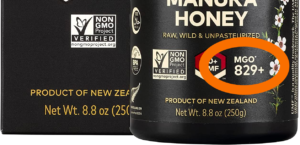Table of Contents
Introduction
As discussed previously on our blog, the popularity of Manuka honey has been steadily growing due to its wide-ranging benefits. Produced in New Zealand by bees that pollinate the Manuka bush, this type of honey is known for its antibacterial properties. It has been used in the treatment of various wounds, ranging from minor cuts and burns to more serious injuries. In this article, we will explore the different medical conditions that can be treated using Manuka honey, how it works, the benefits of using it in wound care, and provide tips for finding the best Manuka honey products on the market.
Types of Wounds Treatable by Manuka Honey
Studies have shown that Manuka honey can effectively treat a variety of conditions, including antibiotic-resistant bacteria like MRSA, which is a major concern in hospitals. Additionally, it has been found to promote the growth of new tissue and reduce inflammation, thereby speeding up the healing process. Here are some of the wound conditions that can be treated using Manuka honey:
- Minor cuts and abrasions
- Burns (including sunburns)
- Ulcers (pressure, diabetic, venous)
- Surgical wounds
- Bedsores
- Insect bites and stings
How Manuka Honey Works
Manuka honey’s antibacterial properties can be attributed to the presence of hydrogen peroxide, which is produced by the enzyme glucose oxidase in the honey. Moreover, it contains a unique compound called methylglyoxal (MGO), which has been found to have even stronger antibacterial properties than hydrogen peroxide alone. When applied to a wound, Manuka honey forms a barrier that protects it from bacteria and other harmful microorganisms. Additionally, it acts as a natural anti-inflammatory agent, reducing pain and swelling.
Using Manuka Honey in Wound Care
Manuka honey can be used in various ways for wound care. These include:
-
Topical Application: Simply apply a thin layer of Manuka honey directly to the wound and cover it with a sterile bandage. This method is suitable for minor cuts and abrasions.
-
Honey-Impregnated Dressings: These dressings are pre-soaked in Manuka honey and can be applied directly to the wound. They are particularly useful for burns, ulcers, and surgical wounds.
-
Manuka Honey Gel: This is a thicker form of Manuka honey that can be applied directly to deeper wounds. It provides a protective barrier and helps promote healing.
When using Manuka honey for wound care at home, it is essential to ensure that the honey is medical-grade and has a high level of MGO. It is also important to consult with a healthcare professional before using Manuka honey, especially if you have allergies or medical conditions that may be affected by its use.
Choosing the Correct Honey Product
When selecting a Manuka honey product for wound care, it is crucial to consider the Unique Manuka Factor (UMF) rating. This rating measures the antibacterial activity of the honey and is indicated on the label. A higher UMF rating signifies a more potent antibacterial activity. For wound care, a UMF rating of 10 or above is recommended. However, it is important to note that not all Manuka honey products are created equal, and the UMF rating is not the only factor to consider.
Another factor to consider is the purity of the honey. Look for a product that is 100% pure Manuka honey, like Activon, with no additives or fillers. This ensures that the honey retains its natural antibacterial properties and is not diluted with other substances.
Get Help
If you have a wound that is not healing properly or is at risk of infection, incorporating Manuka honey into your wound care regimen may be beneficial. However, it is crucial to consult with a medical professional before using Manuka honey, especially if you have allergies or medical conditions that may be affected by its use.
The staff at Medical Monks is always available during business hours to provide information related to Manuka honey or any other products they sell. You can get help via LiveChat, email ([email protected]), or by calling 844-859-9400, Monday through Friday from 8am to 7pm.
In conclusion, Manuka honey has proven to be a valuable asset in wound care. Its antibacterial properties, ability to promote tissue growth, and anti-inflammatory effects make it an effective treatment for various wounds. By choosing the right Manuka honey product with a high UMF rating and ensuring its purity, you can harness the benefits of this natural remedy. However, it is essential to seek professional advice before incorporating Manuka honey into your wound care routine.



